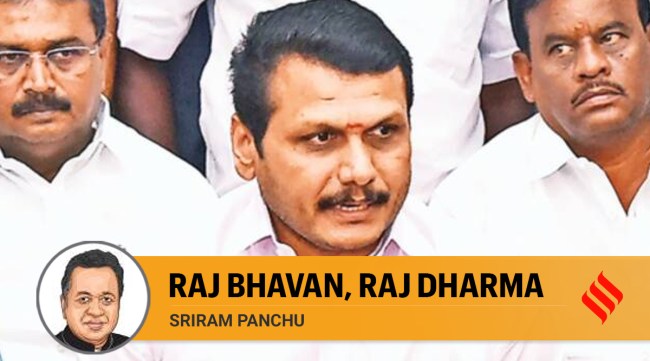Opinion Sriram Panchu writes: Governor R N Ravi’s actions do not behove his office
Governor is a wise counsellor to the chief minister. This did not happen in Tamil Nadu
 V. Senthil Balaji addresses a press conference
V. Senthil Balaji addresses a press conference Once more, a governor is in the news, and once more for not the best reasons. V Senthil Balaji is a Tamil Nadu minister under investigation by the state police and the Enforcement Directorate on cash for jobs charges. Chief Minister M K Stalin has divested him of his portfolios but retains him as a minister without portfolio; Governor Ravi has ordered his dismissal. Whatever his reasons may be, he is constitutionally out of order.
Although the Constitution says that ministers hold office at the pleasure of the governor, this is not meant to be taken literally as Ravi seeks to do. Right from Shamsher Singh’s case in 1974, authored by seven judges of the Supreme Court, and subsequently in S R Bommai (1994) and Shivraj Singh Chouhan (2020), the law is that in this and other matters, the governor must act on the aid and advice of the Council of Ministers. There are some exceptions which are not relevant here. Appointing and dismissing a minister is the prerogative of the chief minister. Ravi has kept his missive in abeyance citing Home Ministry advice to consult the Attorney-General. He ought to have done that in the first instance, instead of shooting first and asking questions afterwards.
But that raises a larger question. Granting that the governor cannot dismiss a minister, is it a completely hands-off situation for a governor who may be genuinely concerned about the continuance of a minister facing charges? The answer to that lies not in the law but in constitutional practice, convention and observance of norms.
When a respected figure is appointed as a governor, he comes with some positive capital of respect. When the person conducts herself with moderation and restraint, keeps above the fray of politics, doesn’t court controversy and preserves the dignity of the office, that initial respect gets enhanced and becomes a reservoir of trust. The governor becomes what he is supposed to be — a wise counsellor, whose words of advice and caution, even on matters outside his legal ken, will ordinarily be heeded by a chief minister.
Ravi, unfortunately, has disabled himself from being such a figure, mostly on account of his penchant for needless controversies. Skipping portions of the Governor’s Address eulogising leaders like Kamaraj and Annadurai and Periyar, walking out of the Assembly in a huff, debunking Dravidian ideology, advising UPSC selectees to choose the Centre over the state in a conflict, withholding bills indefinitely, etc, put you on a collision course with your government. Net result: Even if Ravi has something sensible to say, Stalin will be loathe to accept it. Ravi needs to try and emulate distinguished earlier governors like Gopalkrishna Gandhi and T N Chaturvedi. His ultimate role model should be none other than our President Droupadi Murmu, who personifies grace and dignity and served with distinction as Governor of Jharkhand.
This leads us to the question that is invariably asked when such episodes erupt: Do we need governor at all? If they perform like they seem to be doing now in different states, the answer may be a thumbs down. But there is value in the post, both for constitutional and ceremonial functions. Much lies in appointing the right persons, and by a proper method which reduces favouritism and reward. Perhaps a solution lies in drawing up a cadre of distinguished persons from different fields — civil service, armed forces, academics, culture, respected former ministers and the like. While there are cautions about judges, this could be obviated if it operates on a roster, and candidates aren’t chosen by the executive. There needs to be a cooling off period so that the attractions of the post do not deflect the person. And one term of five years should do. From this panel, a suitable name should be picked in consultation with the chief minister so that there is no fear of a troublesome element being lodged in Raj Bhavan. One should look for a certain stature born out of accomplishment and integrity. A good governor is an asset to the state, straddling the federal divide.
One may also note that in recent times, the number of Opposition party state ministers being investigated, especially by the ED, has gone up dramatically. Not just investigated, but lodged in jail. And for long periods, well beyond the time reasonably required for custodial interrogation. The application of the Prevention of Money Laundering Act, bolstered by unfortunate decisions of the Supreme Court, results, among other consequences, in inordinate difficulties in securing bail since the presumption of innocence is overturned.
There is another point which may be relevant in a larger context. While on the one hand, one does not wish to a state-of-affairs in which ministers are under the cloud of criminal charges, it cannot be denied that there is a serious mixing of criminal investigation and prosecution with politics.
The more we are blind to this, the greater proportion it will acquire. We need probity in governance, but we also need checks on political misuse of the enforcement machinery.
The writer is Senior Advocate, Madras High Court






